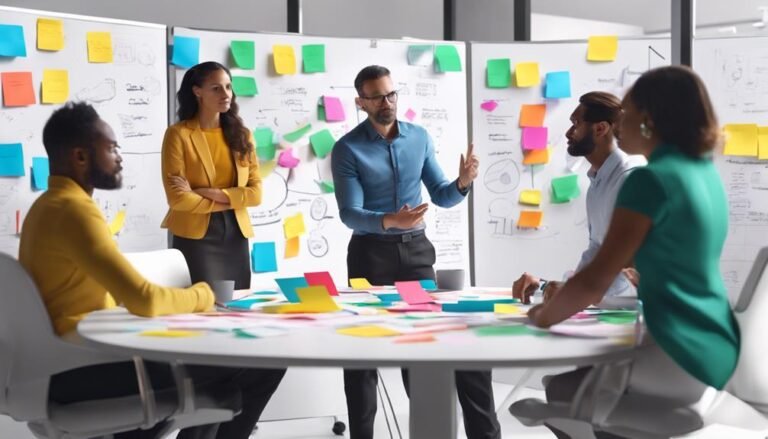Teamwork as a Soft Skill
Teamwork, a crucial soft skill, boosts collaboration, achieves common goals, and enhances team effectiveness. It creates synergy, combining diverse skills for success. Trust and open communication are key for cohesive teamwork. Roles must be clearly allocated based on strengths. Resolving conflicts promptly maintains productivity. Recognizing and celebrating team achievements fosters unity and morale. These aspects highlight the importance and impact of teamwork in professional settings, leading to improved outcomes and a positive work environment. To discover more about honing your teamwork skills for success, explore further details on the benefits and strategies provided.
Key Takeaways
- Teamwork showcases collaboration and communication skills.
- Soft skill vital for productivity and success in various settings.
- Enhances problem-solving abilities through diverse perspectives.
- Builds trust, fosters innovation, and creates a positive work environment.
- Essential for achieving common goals and maximizing team efficiency.
The Importance of Teamwork
Teamwork is a fundamental aspect of achieving success in any collaborative endeavor, fostering synergy and efficiency among team members. When individuals come together to work towards a common goal, they combine their unique skills and perspectives to create a cohesive unit that's greater than the sum of its parts. This synergy, or team synergy, allows for the collective success of the group, where each member contributes towards achieving shared objectives.
The importance of teamwork lies in its ability to leverage the strengths of each team member while mitigating individual weaknesses. By working together, team members can fill in gaps, support one another, and collectively overcome challenges that may be insurmountable for any single individual. This collaborative effort not only enhances the quality of work produced but also fosters a sense of camaraderie and shared achievement among team members. Ultimately, teamwork is the cornerstone of success in any collaborative project, enabling teams to reach new heights of achievement and productivity.
Benefits of Collaborative Efforts
In collaborative efforts, team members can leverage their collective strengths to enhance productivity and achieve shared goals effectively. When individuals come together to work collaboratively, the benefits are numerous:
- Collaborative Problem Solving:
By pooling together diverse perspectives and skill sets, teams can tackle complex problems more efficiently and effectively. Each team member brings a unique approach to problem-solving, leading to innovative solutions that may not have been possible individually.
- Team Synergy:
Collaborative efforts foster a sense of unity and cohesion among team members. When individuals work towards a common goal, they can build on each other's ideas, motivate one another, and create a positive work environment that enhances overall productivity.
- Improved Communication:
Working collaboratively requires open communication and active listening. Team members learn to effectively articulate their thoughts, provide constructive feedback, and make certain that everyone is on the same page, leading to smoother project execution.
- Enhanced Learning:
Collaboration allows team members to learn from one another's experiences and expertise. Through sharing knowledge and skills, individuals can grow professionally and develop new competencies that benefit both the team and the organization as a whole.
Building Trust Within Teams
To foster effective collaboration and maximize team performance, establishing trust within teams is paramount. Trust building is the foundation upon which cohesive collaboration and group cohesion are built. In team dynamics, trust is the belief in the reliability, truth, and ability of each team member. It's cultivated through open communication, transparency, and consistency in actions.
Team members must demonstrate trustworthiness by following through on commitments, being honest in their interactions, and showing respect for others' opinions. Building trust involves active listening, empathy, and a willingness to support one another. When team members trust each other, they feel safe to express their ideas, take risks, and work together towards common goals.
Trust within teams leads to improved morale, higher productivity, and a more positive work environment. It reduces conflicts, enhances problem-solving capabilities, and fosters innovation. As trust grows, so does the sense of unity and collaboration among team members, ultimately resulting in greater overall success.
Effective Communication Strategies
When looking at effective communication strategies within a team, it's important to focus on clear message delivery, active listening skills, and open, honest communication.
By ensuring that your messages are concise and easily understood, you set a strong foundation for effective team interactions.
Active listening plays a key role in fostering understanding and collaboration among team members, leading to smoother communication processes.
Clear Message Delivery
Improving message clarity in communication involves utilizing active listening techniques to guarantee understanding and alignment among team members. To guarantee effective message delivery, consider the following strategies:
- Use Simple Language: Avoid jargon or complex terms to make your message easily comprehensible.
- Provide Context: Offer background information to help team members grasp the significance of the message.
- Ask for Confirmation: Encourage team members to summarize what they understood to confirm alignment.
- Use Visual Aids: Incorporate diagrams, charts, or graphs to supplement verbal communication and enhance understanding.
Active Listening Skills
Enhancing your team's communication effectiveness involves sharpening active listening skills to guarantee clear understanding and alignment among members. Active listening techniques such as maintaining eye contact, restating to confirm comprehension, and posing clarifying questions play a vital role in effective communication. These techniques help in fostering a collaborative environment where every team member feels heard and valued. However, communication barriers like distractions, preconceived notions, and cultural differences can hinder active listening and impede the team's progress. By actively listening and addressing these barriers, teams can enhance their overall communication effectiveness, leading to improved productivity and stronger relationships.
| Active Listening Techniques |
|---|
| Maintain eye contact |
| Restate for confirmation |
| Pose clarifying questions |
Open and Honest Communication
To establish a culture of transparency and trust within your team, prioritize open and honest communication as a cornerstone of effective communication strategies. Here's how you can enhance your team's communication dynamics:
- Trust Building Exercises: Engage in activities that promote trust among team members, such as team-building exercises or sharing personal stories.
- Transparent Feedback: Provide feedback that's constructive, specific, and conveyed in a transparent manner to promote growth and development.
- Regular Check-ins: Schedule regular check-in meetings to discuss progress, address concerns, and verify everyone is on the same page.
- Encourage Dialogue: Create an environment where team members feel comfortable sharing their thoughts and ideas openly, fostering collaboration and innovation.
Roles and Responsibilities Allocation
In effective teamwork, assigning roles and responsibilities is a critical step to guarantee clarity and accountability within the team dynamic. Task delegation involves dividing the workload efficiently based on each team member's strengths and expertise. This process safeguards that tasks are completed effectively and in a timely manner. Role assignment is equally important, as it defines each team member's position and responsibilities within the project or task at hand.
When allocating roles and responsibilities, it's crucial to take into account the skills and competencies of each team member. By matching individuals with tasks that align with their abilities, you can optimize productivity and promote a positive working environment. Clear communication regarding roles and responsibilities helps prevent misunderstandings and ensures that everyone is on the same page.
Furthermore, establishing a system for accountability and progress tracking is essential. Regular check-ins and updates allow team members to discuss any challenges they may be facing and make necessary adjustments to guarantee the team's success. By effectively managing roles and responsibilities, you contribute to a cohesive team dynamic and overall project success.
Resolving Conflict in Teams
When conflicts arise within a team, addressing and resolving them promptly is vital to maintaining productivity and fostering a positive working environment. Conflict resolution is an essential skill in team dynamics that can lead to stronger relationships and better outcomes.
Here are four key strategies to effectively resolve conflicts within a team:
- Open Communication: Encourage team members to express their concerns openly and listen actively to each other's perspectives.
- Identify the Root Cause: Dig deep to understand the underlying issues causing the conflict rather than just addressing surface-level disagreements.
- Seek Compromise: Encourage team members to find common ground and work together to find solutions that satisfy everyone involved.
- Mediation if Needed: In cases where conflicts escalate, consider involving a neutral party to mediate and facilitate a resolution process.
Enhancing Team Productivity
Enhance your team's productivity by implementing strategic time management techniques and setting clear goals to guide collective efforts towards success. Effective time management guarantees that tasks are completed efficiently, avoiding unnecessary delays. Encourage your team to prioritize tasks based on urgency and importance, utilizing tools like Gantt charts or task management apps to track progress and deadlines. By allocating time wisely and avoiding multitasking, you can enhance productivity and focus on high-impact activities.
Understanding team dynamics is essential for enhancing productivity. Recognize each team member's strengths and weaknesses to delegate tasks effectively and foster a collaborative environment. Group synergy plays a critical role in achieving collective goals. Encourage open communication, active listening, and constructive feedback to enhance cooperation and innovation within the team. By promoting a culture of transparency and mutual support, you can harness the diverse skills and perspectives of team members to drive productivity and achieve success efficiently.
Recognizing Team Achievements
When acknowledging team achievements, it's crucial to celebrate the wins collectively, reinforcing a sense of unity and shared success.
By recognizing individual efforts within the context of the group, you highlight the importance of collaboration and teamwork in achieving milestones.
Emphasizing the collaborative journey towards success not only motivates team members but also fosters a strong sense of camaraderie and mutual respect.
Celebrating Team Wins
Recognizing team achievements is an essential component of fostering a positive and collaborative work environment. Celebrating team wins not only boosts morale but also strengthens the bond among team members, creating a more cohesive unit.
Here are some key reasons why celebrating team wins is vital:
- Motivation Boost: Recognizing achievements motivates team members to continue working towards excellence.
- Fostering Camaraderie: Celebrating successes together helps build trust and camaraderie among team members.
- Acknowledgement of Effort: It shows that individual contributions are valued and appreciated.
- Setting a Positive Tone: Celebrating team wins sets a positive tone for future endeavors, encouraging teamwork and collaboration.
Acknowledging Group Efforts
To further cultivate a culture of collaboration and excellence within your team, it's important to actively acknowledge the collective efforts that contribute to achieving shared goals and successes. Group recognition plays a crucial role in fostering a sense of belonging and motivation among team members.
By acknowledging the contributions of each individual towards the team's accomplishments, you reinforce a culture of appreciation and respect. This recognition not only boosts morale but also strengthens team synergy, encouraging continued collaboration and productivity.
Celebrating team wins isn't just about the final outcome, but also about recognizing the journey and the combined dedication that led to success. Emphasizing group efforts creates a positive environment where every team member feels valued and motivated to excel.
Highlighting Collaborative Success
Highlighting the collective achievements of your team members is essential in fostering a culture of collaboration and recognizing the combined efforts that lead to success. When acknowledging collaborative achievements, you promote shared success and reinforce the importance of teamwork. Here are some key points to ponder:
- Team Synergy: Emphasize how each team member's unique strengths contribute to the overall success of the group.
- Collective Impact: Showcase how working together towards a common goal can lead to greater outcomes than individual efforts.
- Recognition: Acknowledge and celebrate the contributions of each team member to boost morale and motivation.
- Feedback Loop: Establish a feedback mechanism where team members can provide input on how to improve collaboration further.
Developing Teamwork Skills
Effective teamwork is cultivated through consistent communication, mutual respect, and a shared commitment to achieving common goals. Developing teamwork skills involves understanding team building and group dynamics. To enhance your teamwork abilities, consider the following key aspects:
| Teamwork Skills | Description |
|---|---|
| Communication | Open, honest, and effective communication is essential for successful teamwork. Actively listen to your team members and express your thoughts clearly. |
| Collaboration | Working together towards a common goal requires collaboration. Embrace different perspectives, delegate tasks effectively, and contribute your unique skills to achieve collective success. |
| Conflict Resolution | Conflicts may arise in any team setting. Learn to address conflicts constructively, focus on solutions, and maintain a positive team environment. |
Conclusion
You've learned how teamwork is an essential soft skill in any workplace. Just like a symphony orchestra, each member plays a unique role in creating beautiful music together.
By fostering trust, effective communication, and resolving conflicts, teams can achieve great things. Remember, teamwork makes the dream work!
So, embrace collaboration, celebrate achievements, and watch your team soar to new heights.








